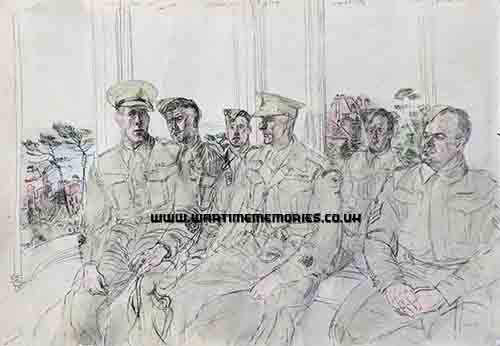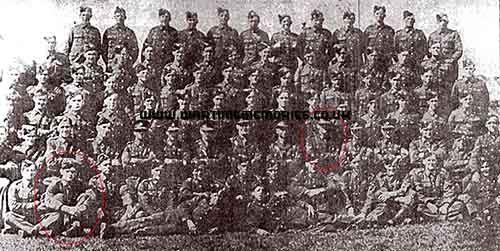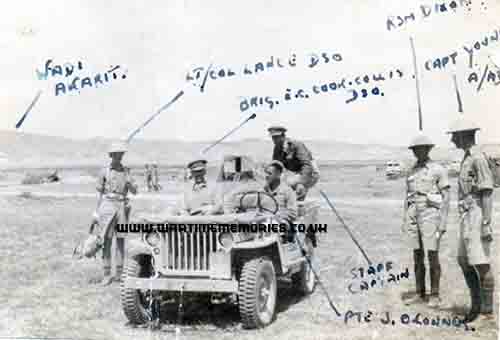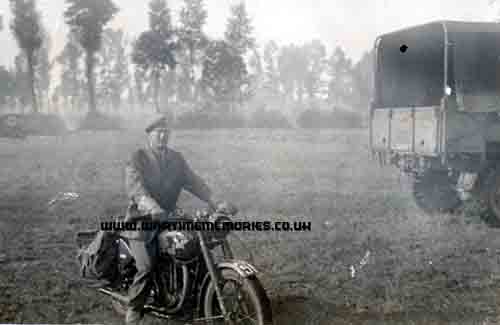RSM. George William Dixon MBE.
British Army 6 Btn. Green Howards
from:Middlesbrough
At the outbreak of WW2 George Dixon held the position of CQMS. The 6th Battalion Green Howards formed a part of the BEF which were driven back to Dunkirk. George recounted stories of being up to his neck in water waiting to be taken off while the Luftwaffe shot at them.
Reforming in UK, he continued to serve with 6 Btn through North Africa, including the battles at Wadi Akarit and El Alamein. He told two stories of his time in North Africa - being very impressed with the solar compass fastened to the 4 tonners - going out from the lines for a night time walk, being impressed with the clear starry sky then becoming lost, before finally recovering his way back to a different position of the lines where, providing the correct password, he was told that he just walked through a defensive minefield.
The invasion of Sicily followed - George told a story of the men being allowed to rest and dry off in the olive groves during a lull where fires were lit and someone came along and entertained the men with his singing. My father-in-law, William Smith RM Commando, much later told a similar story because he was the man who entertained with his singing and a GH who produced a guitar (the two men never met, George passing away in 1980 some years before I encountered Bill).
Pulled back to the UK in preparation for the Normandy landings, he told another story of the practice landings in Scotland - he was by now appointed RSM - during the first practice assault, with live fire from supporting naval guns, having come ashore, the CO asked him which direction they should go and produced a map and compass - neither the CO nor the RSM found that they could not read the map nor use the compass - a rapid course of map reading, etc, followed.
At the Normandy landings on Gold Beach, as RSM he was given the honour of carrying the Regimental Colours ashore in the first wave - there is film footage of this event recently shown on TV which the commentator confirmed as being Gold Beach - this had been a story in the family for many years.
He also had a story of the beach landings as follows. Waiting to come ashore in the landing craft with the men, many were sick with the pounding they received from the sea, others had to urinate, but as RSM despite having a need he provided the example by holding on himself. Ashore and charging up the beach he took the opportunity to shelter behind a large concrete block to relieve himself after dumping all the kit and ammunition he was carrying. As he was urinating there was an explosion back where his kit and ammo had been dumped - finishing he came to pick it up to find that it had all been blown up my a mortar shell.
During the push inland, he was blown up by another mortar shell and wounded in the shoulder with shrapnel - that wound was basically treated and he continued his duties (as a young man raised by George, my grandfather, he had a very soft hump on his right shoulder where the shrapnel was still embedded - this was finally removed during an operation at North Ormesby Hospital round about 1956/7 or thereabouts.
He continued with the battalion to the "Island" where it became bogged down by the enemy defending the route to the Nijmegen Bridge. He told a story of his time there when the battalion was desperately short of ammunition and orders were issued for everyone to make the noise of magazines being loaded, bayonets being fixed and other general noise, to convince the enemy that an attack may be coming. From stories I picked up as a child, confirmed by my late mother many years later, he volunteered, as a good swimmer, with a couple of other similarly skilled soldiers, to swim down one of the canals pushing a raft past the enemy to reach allied lines, load the raft with ammunition, and then swim back with it to replenish the battalion. After the "Island" the battalion were pulled back to Britain, and ultimately disbanded as the war came to a close.
He accepted being transferred and rebadged to 50 BOD, based in Cyprus and subsequently in Egypt until 1949 when he was required to return to the UK for family reasons, finishing his regular service. He spent many years afterwards as RSM to the NRACF Green Howards and was based in Middlesbrough - I saw him in uniform at a Regimental Parade at an annual camp at Brancepeth round about 1957/8 and last saw him associated with the ACF in 1963 as a guest steward at Hornsea annual camp.




